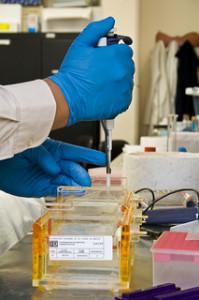Genetic testing offers people a rare glimpse into their future and unlocks more information than some people may want to know ahead of time. The news about the actress Angelina Jolie opting for a double mastectomy based on test results that showed she had a 90 percent probability of developing the disease, has garnered a lot of media attention and provoked many conversations about the subject of genetic testing. As is true with most big decisions in life, there are pros and cons surrounding genetic testing.
Genetic testing can be done with home kits or in a doctor’s office. There are many legal and medical reasons for using genetic testing. A motherless paternity test can be used for legal purposes in family affairs. Prenatal testing is helpful for screening for risks of passing along certain serious diseases.
 Questions to Ask before Being Tested
Questions to Ask before Being Tested

There are some questions that a person should answer prior to taking a genetic test. How accurate are the results? What is the cost? Will the insurance company cover the cost? Will the information be helpful for taking preventative measures? Is the disease currently curable? Can the information be used by insurance companies to discriminate? Will the information provided be useful for the family for planning purposes or emotionally devastating?
Cancer Testing
A perfect example of genetic testing being put to good use is where possible BRCA mutations are a possibility. This gene mutation increases the risk of developing breast cancer from 12 percent to 60 percent. Given that an estimated 750,000 American females have the same mutation that Angelina Jolie carries, it makes perfect sense for these women to know about it so they can make lifestyle changes to improve their odds. At the very least, more frequent screening is called for in this scenario.
While knowing you are at a higher risk for breast cancer is helpful, a person can not be sure they will not get breast cancer just because they do not have the BRCA mutation. One valid concern related to genetic testing is that people may forgo taking normal precautions and not get screened as they should if genetic testing does not confirm they are at a high risk for getting the disease.
Emotional Reasons for Not Testing
Testing for diseases that are not preventable or curable brings bad news to people long before it is absolutely necessary. Getting news about having Alzheimer’s in your future would be devastating for anyone. Doctor’s often discourage testing in situations like this, since there is no way to prevent the disease ahead of time.
Summary
If genetic testing can be used to help eliminate the possibility of passing along terrible diseases to offspring or alert people about the high risk of developing certain diseases, then it is useful and worthwhile. Given that not all tests are reliable and that home kits can provide poor results, the information gathered is not irrefutable. Genetic testing is only as good as the professionals reading the results.
Image Credit: ismael villafranco

